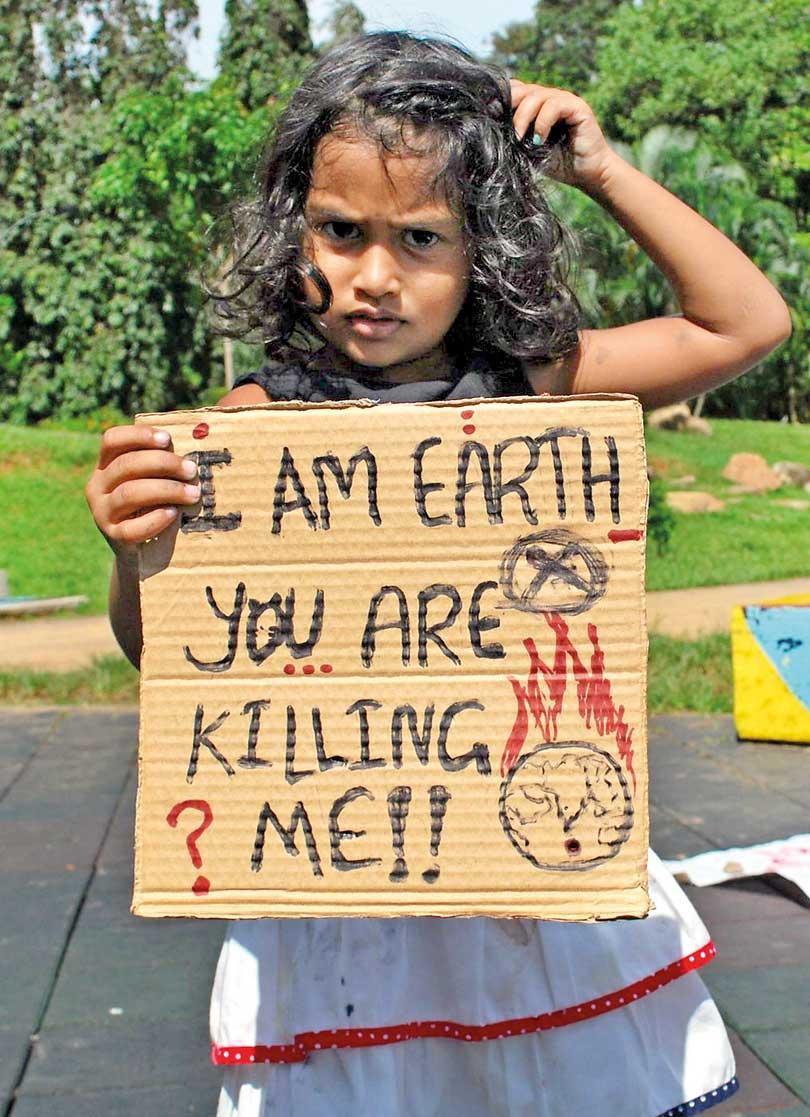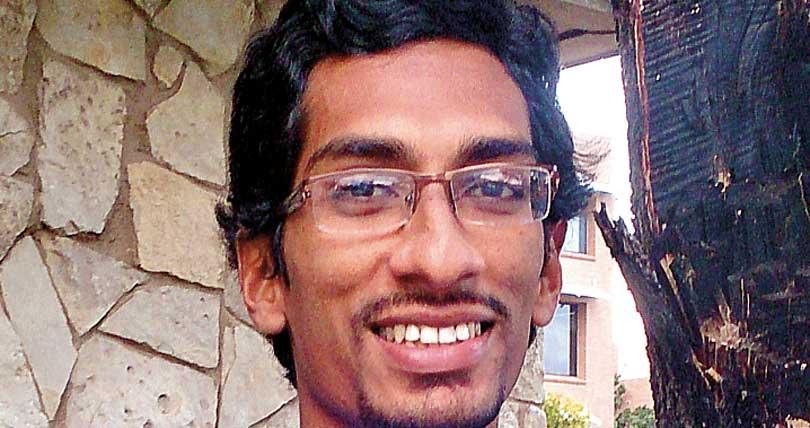10 Oct 2019 - {{hitsCtrl.values.hits}}
 Waking up daily to the sight of the Karadiyana garbage dump, breathing contaminated air, seeing littered streets and his child experiencing these toxic conditions alerted Gihan Mackay to the urgency of environmental conservation. So Mr Mackay and his friends, Melani Gunathilaka, Pavithra Stembo, Shyama Basnayaka and Roashan Kamal, decided to raise environmental awareness. As a first step, they organized a climate strike on 27 September at the Viharamahadevi Park.
Waking up daily to the sight of the Karadiyana garbage dump, breathing contaminated air, seeing littered streets and his child experiencing these toxic conditions alerted Gihan Mackay to the urgency of environmental conservation. So Mr Mackay and his friends, Melani Gunathilaka, Pavithra Stembo, Shyama Basnayaka and Roashan Kamal, decided to raise environmental awareness. As a first step, they organized a climate strike on 27 September at the Viharamahadevi Park.
The five Colombo-based friends come from different professions. Ms Stembo and Mr Mackay are designers, Ms Gunathilaka upcycles flip-flops into fashion accessories, Ms Basnayake is a freelance writer, and Mr Kamal is a law student. But they share a common passion to protect the environment and shared their thoughts with .......
“Many are aware there is a problem but don’t know how serious it is. And most don’t know how to help combat climate change. We want to educate people on how to minimize the impact. This is a silent, peaceful protest to raise awareness,” Ms Gunathilaka said. Ms Stembo added that the climate strike was influenced by similar global actions.

Recounting an incident at Good Market, Ms Gunathilaka said a customer had berated a vendor for not offering plastic bags.
“According to the market’s no-plastic policy, the vendor didn’t offer a plastic bag. The customer was enraged, and complained about bad customer service,” she said. Recalling another incident, Mr Mackay said he once saw a man in Ahangama throwing a garbage-filled gunny bag into the ocean and walking away.
The activists revealed that some people are unaware of climate change dangers. “Everyone blames the government. The government has a responsibility. But we also can do little things, like segregating waste, reusing plastic bags, choosing eco-friendly options and educating ourselves on ethical practices,” Ms Stembo said.
Mr Mackay added the government must educate people on climate change and promote ethical practices. “We all must minimize our impact on climate change,” Ms Gunathilaka noted.
“The climate strike aimed to change people’s mindsets and connect them with like-minded others to take collective action.” She stressed that an environmentally-friendly lifestyle didn’t mean a zero-waste life, but rather knowing one’s environmental impact and living eco-consciously. Plastic-use and ocean pollution

Muditha Katuwawala
The climate strike focused mainly on reducing plastic-use and ocean pollution. “Introducing laws against plastic use won’t help without having alternatives,” Ms Stembo said. Ms Gunathilaka added, “Around 20 years ago, shops charged for plastic bags. So people re-used them. Now they’re given free, and are accumulated, and dumped in landfills or the ocean.”
The activists spoke of small industries that produced biodegradable packaging. They said the government should support such industries and encourage businesses to follow eco-friendly practices to eliminate plastic use.
Meanwhile, coordinator of marine conservation group ‘Pearl Protectors’ Muditha Katuwawala told Daily Mirror that ocean pollution harmed tourism and the economy as a whole. He said the significant increase in shipping had worsened ocean pollution. “New shipping lines are opening up causing oil spills, which are a huge issue. Recently there was one in Wellawatte, and it was hard to trace the vessel,” he said, adding that dynamite fishing and illegal overfishing also harmed marine life. “About 90 per cent of coral reefs are damaged due to global warming. Tourists step on them and boats ram into them,” Mr Katuwawala said. Coral reefs take centuries to regrow. Global warming also causes algae to grow on the ocean surface, which decreases penetrating sunlight, thereby cooling the deep sea and endangering marine life.

Avishka Sendanayake
“The science is 100 per cent correct. I’ve done research and know that climate change is not a myth. If you spend a little time looking at the statistics, they will scare you,” environmentalist Avishka Senanayake, who was at the climate strike, said. She said Sri Lanka was rich in environmental policies, but poor in implementation. “The government is trying to implement certain projects, but the country as a whole isn’t taking any serious steps,” she noted.
She was alarmed that the 2019 Global Climate Risk Index ranked Sri Lanka second, and emphasized that awareness was key.
“Awareness must start from a young age. Schools should play their part. Students must be involved in environmental projects, and not live detached from them. They must learn the importance of acting now, or risk our futures being severely impacted,” she said.
18 Apr 2024 56 minute ago
18 Apr 2024 3 hours ago
18 Apr 2024 4 hours ago
18 Apr 2024 5 hours ago
18 Apr 2024 5 hours ago